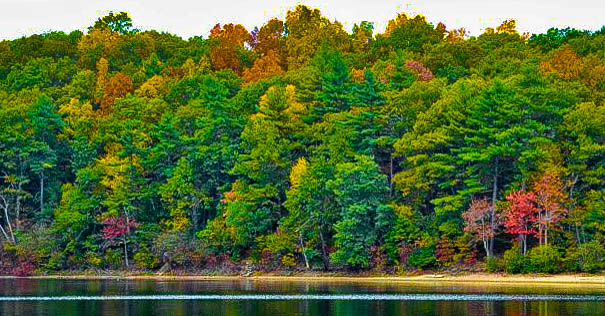“The scenery of Walden is on a humble scale, and, though very beautiful, does not approach to grandeur, nor can it much concern one who has not long frequented it or lived by its shore,” wrote Henry David Thoreau.
The American writer lived by the Concord, Massachusetts, pond’s shore, in a 14’4” x 10’4” x 14’ (at its peak) wooden cabin that he built himself, on land owned by Ralph Waldo Emerson. There he stayed for two years, two months, and two days, beginning in 1845.
Thoreau prized nature and simple living. He believed in individual freedom and was a lifelong abolitionist. In July 1846, he spent a night away from the cabin–in jail. He’d been on his way to run an errand in town when the sheriff arrested him for refusing to pay a local tax as part of his protest against slavery. The incident inspired him to write his influential essay, “Resistance to Civil Government”, later renamed “Civil Disobedience”. In it, Thoreau emphasized the primacy of individual conscience over government force in moral matters and the right of an individual to withhold financial support from an unjust government. He became more publicly radical after the passage of the Fugitive Slave Act in 1850, writing and speaking against it, and personally aiding runaway slaves escaping to Canada via the Underground Railroad.
This post contains affiliate links. For more information, click here.
A replica of the cabin stands there now, and aside from the common comforts of tourist sites, from rest rooms to a gift shop, Walden Pond today looks much as one might imagine it did while Thoreau was living out his belief “that if one advances confidently in the direction of his dreams, and endeavors to live the life which he has imagined, he will meet with a success unexpected in common hours.”
Even at the peak of Autumn, golden foliage is spotty, with much green remaining. And (unlike in summer) visitors are sparse. Few families stroll along the shore. Even fewer hardy souls kayak or swim. It is a peaceful setting, and a pleasant respite from the world of tyrants and tit-men whom Thoreau and all lovers of the individual contemn in any place and time.
But sadly, two hours, two minutes, and two seconds is probably all that most of us today would be able to spend before finding we “could not spare any more time”.
After my misspent youth as a wage worker, I’m having so much more fun as a blogger, helping other discerning travellers plan fun and fascinating journeys. Read more …

